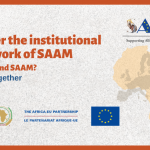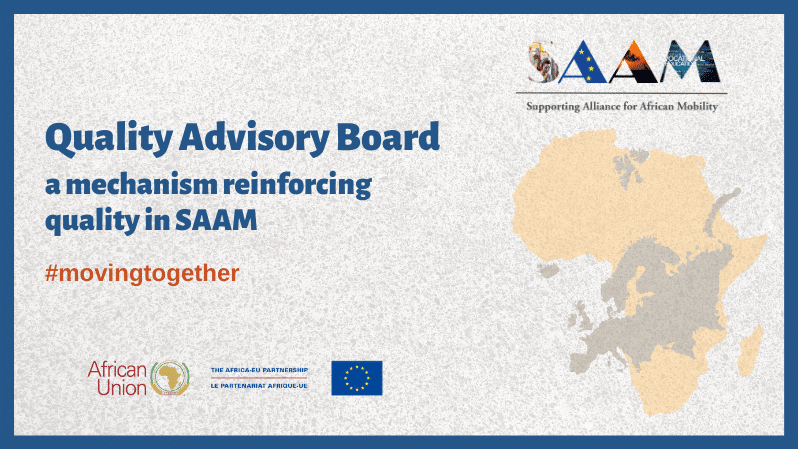The Quality Advisory Board (QAB) is a complementary assessment and advice system enabled in SAAM with the objective of taking it to the highest levels of quality possible. This board is formed by six volunteers with a profound experience in the fields of TVET, Education policies, entrepreneurship and job insertion for youngsters. They will provide guidance based in their expertise to get the best results out of it and to ensure both an effective implementation and a permanent impact over the upcoming years.
The quality system of SAAM is bullet-proof! From its inception, designing a perfect quality control system for SAAM was established as one of the cornerstones of the project. One of the SAAM’s workpackages, lead by AKMI and Asociación Mundus, provides a Quality Control Plan as a framework in which a Quality Assurance Structure is provided, including a Quality Control Board (QCB) as the main assessment body, but also the Quality Advisory Board (QAB). This additional and voluntary control mechanism provides an extra level of scrutiny and control of SAAM development, based on an impeccable level of quality and accuracy.
All the members of the Quality Advisory Board (QAB) are recognized specialists at a National, European and/or African level in the fiend of education and TVET. The QAB is therefore a valuable source of expertise and country specific insights, and their input and views will ensure the deliverables are targeted, demand-led and industry related. We have asked the members of this sort of ‘Council of Wisdom‘ to tell us more about their experience and how they approach SAAM from their specific backgrounds and expertise. Let’s get to know them in depth!
Doctor Madlen Serban (Romania)
“SAAM is an ambitious, complex, and pioneering endeavor that can offer so needed opportunities for transformation and trans-continental mobility in VET!”
Doctor Serban is a visiting professor at the Faculty for Psychology and Educational Sciences of the University of Bucharest. She was for 8 years (the maximum legally allowable mandate) the director of the European agency for human capital development under the European Union external relations, the ETF. She has a far-reaching international experience from her work as a senior expert for bilateral and international organizations, including UNESCO, USAID, the European Commission, Erasmus+ included, OECD and the World Bank. She has spent most of her career working in the field of vocational education and training, as genuine part of integrated and holistic policies in action for human capital development.
During a significant length of her time at UNESCO and at the ETF (among other projects), she had the chance to get in contact with “the splendid diversity of the continent, whether it’s about its people potential, cultural traditions or growth opportunities”. She has thoroughly worked on VET transformation, therefore Dr. Serban approaches SAAM as a sharing and learning space for professionals who aim to “moving the needle in the intended direction”. In her words, achieving a solid cooperation between continents in terms of Education implies “urgent, equitable and of good quality enhancement for the purposes of Africa’s prosperity and its youth wellbeing, at home and elsewhere”.
Dr. Madler Serban’s first advice: “Do not hunt for short term trophies! Such project takes time!”
Beatrice Khamati Njenga (Kenya)
“Exchanges between Africa and Europe can serve to facilitate mutual learning, enhance knowledge of the potential of TVET enhance quality and build global friendships for peaceful coexistence”
She is a reductionist and environmental scientist. One of her main goals is ensuring that all people have access to quality transformative education and training, that imbues a wide range of literacies, and life skills and values of integrity and responsible citizenship, employability and entrepreneurial skills, along with critical mindset. “I endeavour to engage with and accordingly influence organisations and institutions active in these fields”, explains Ms. Khamati. She describes herself as “African with a heart for empowering the next generation of leaders of integrity, to build an Africa that is integrated, peaceful and prosperous, believing that our youthful population is our greatest asset”.
Her perception of SAAM is that it is a project that aims high, therefore it is crucial for it to “remain aligned to AU vision and be responsive to the aspirations and perspective of participants, to ensure quality and promote sustainability”. In her opinion, TVET is one of those areas through which we can have the greatest impact on the largest proportion of the population, thereby harnessing the youth demographic dividend and turning a potential challenge into an immense power for transformation.
Ms. Beatrice Khamati Njenga’s first advice: “Maintain mutual respect and mutual accountability, and clarity of roles and expectations”.
Doctor Edwind Tarno (Kenya)
“As a TVET expert for AU it is important that I take part of this project. I want to share the experience that I have in TVET to facilitate this project”
He is a doctor in organisation development and TVET principal in Kenya and he has been a technical trainer for the last 32 years. Mr. Tarno was born and raised in Kenya, and he himself was educated in TVET in Africa. He has worked for CAPA to foster TVET growth and has been a consultant for the African Union in the field of TVET.
For Dr. Tarno, SAAM it’s a “brilliant idea that implies enormous benefits for those participating, as well as for the countries where the exchange will take place”. The professor’s interest in taking part in SAAM lies in his idea that prosperity will come through relevant educational systems that are grounded on solving societal needs. In this regard, Dr. Tarno firmly believes that the main goal for a solid cooperation between Africa and Europe is to study and collect data on African TVET, and to do capacity building of African VET staff through international exchange, so as to transfer knowledge and skills in TVET with the European system.
Dr. Edwind Tarno’s first advice: “Maintain the tempos even amid challenges”
Doctor Langat Kipkirui (Kenya)
“SAAM it’s a noble project that guarantees shared prosperity between Europe and Africa”
Trained as a technical trainer qualifying with Bachelor of Education and Master Philosophy in TVET and PhD in Engineering Systems and Management. For last 23 years he has worked in TVET sector, also as a trainer both at TVET and at the University. Moreover, Dr. Kipkirui is involved in policy, standards and quality assurance development and implementation. He is currently Director General of TVET Authority, overseeing coordination and regulation of the sector in Kenya.
When asked about his relation with the African continent, Dr. Kipkirui states: “I sit in a number of meetings discussing matters relating to education and training. I currently oversee some of the programmes which are being implemented by a number of development partners across a number of member States. These include SIFA initiative, Young Africa Works and Australia Awards Africa”. These, among other, are proof of Dr. Kipkirui’s interest in supporting projects that enhance quality of VET education to prepare young people to contribute to socioeconomic development.
In the opinion of Dr. Kipkirui, with relevant training, Africa has a potential to provide a livelihood to over 200 million youths bearing in mind it has 30% of the remaining natural resources in the world. Therefore, “projects like SAAM helps advancing on the way to ensure more youths in the continent are empowered to take charge of their destiny and contribute fully in the socioeconomic development of the continent”.
Doctor Langat Kipkirui’s first advice: “Get to understand priority socioeconomic sectors and key stakeholders/players and support programmes that prepare youths to be engage in the sectors”.
Camila de Epalza Azqueta (Belgium)
“SAAM is a win-win collaboration between Africa and Europe; a strategic alliance”
Ms. de Epalza is a Spanish Sociologist and Political Scientist, specialised in Political Sociology, and European and international affairs. After 6 years working for the United Nations (UNICEF Costa Rica and UNDP Guinea-Bissau), she is the Senior Policy Officer at the Basque Government Delegation to the European Union. As a Policy Officer in External Action, she represents a focal point of European policies in the field of education, creative and cultural industries, development cooperation, SDGs and international agendas. She also advises on those policies to socio-economic stakeholders and public authorities.
Ms. de Epalza, who also holds a three year experience working in African countries in the field of human rights, education and entrepreneurship, believes that SAAM is a “key and strategic project with a sustainable and long term vision”. In her opinion, one of SAAM’s strengths is its capacity to match the potential of skills and education, new partnership, leadership and legacy between the generations, in line with the SDG Goals.
Ms. Esther Estany (Spain)
“We have to join our efforts. Projects like SAAM will help in achieving our goals”
Esther Estany is the current Head of the International Programs in the Public Employment Service of Catalonia. She has always been involved in international mobility projects. She entered the Catalan Public Administration many years ago and back in 1985 she started the Eurodyssey programme, a EU programme for mobility between European regions. She has managed projects within the former Leonardo da Vinci, under Erasmus+ and other regional programmes. She is part of the FREREF and EARLALL organizations, both addressing Lifelong Learning.
Ms. Estany is eager to be part of a project like SAAM. In her opinion, it might help overcoming a concern of our time: “Africa is a continent of young people. It is extremely difficult for these young people to find their professional way. Europe is called the “old continent” and this is true even for the age of its people. We have to join our efforts […]. Projects like SAAM will help in achieving this goal. SAAM will help not only to know each other, but to adapt the skills of young Africans to the European labour market”.
For Esther, the main goal to achieve a solid cooperation between Africa and Europe is stadardising education and qualification systems, so a certificate, degree, VET course achieved, etc. has the same value no matter where it has been obtained. “There is a long way to go and we are late. African youngsters have to acquire international experience. They need to see other realities in order to find their future both abroad or within their own borders”.
Ms. Esther Estany’s first advice: “Please, listen. Listen what African people have to say, what are their needs and expectations. We don’t have to feel like teachers, we have to collaborate”.




